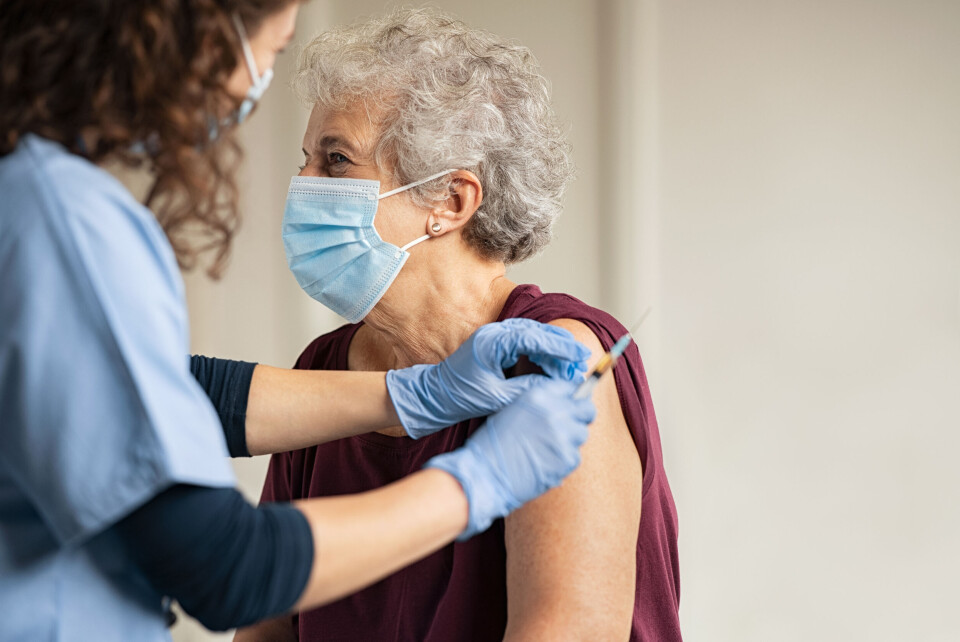-
Mysterious boom rattles residents in south-west France
Local community turns to social media for answers
-
France tightens reimbursement rules for flight delays or cancellations
New measures include mandatory mediation and new claim procedures
-
What snow conditions look like for skiers across French Alps and Pyrenees
Ski resorts are expected to get busier as school holidays begin this weekend
Why is uptake of the Covid Omicron vaccine so low in France?
Numbers remain stagnant with just 10% of over 80s having had their latest booster, prompting the government to issue a ‘solemn call for vaccination’ and a possible return to masks

Covid vaccination rates among those eligible to have booster jabs in France have plummeted, with the health minister warning that the current campaign “is not working” as the ninth wave continues.
Only 10% of eligible people aged 80 or over (the most vulnerable group) have had their booster since the new campaign began on October 3.
This is despite the boosters being among the ‘new’ vaccinations, which are adapted to fight the more contagious Omicron variants more effectively.
Read more: RECAP: France’s booster campaign with ‘new’ Covid vaccines launches
On December 4, Health Minister François Braun told BFMTV that he was issuing a “solemn call to vaccination” and said that the current campaign “is not working”.
He said: “The target groups are the same for flu and for Covid. Take-up has increased slightly over the past week…but it’s still too low.”
So far, 20% of people aged 80 and over have had a fourth dose, while 35-40% of those aged 60-80 overall have had their most recent jabs.
Read more: France Covid: How long after my fourth vaccine dose can I have fifth?
Read more: How do I get an Omicron-targeted Covid booster jab in France?
A return to mandatory masks?
The minister has also said that the current situation could require a return to mandatory face masks and social distancing in enclosed public spaces.
He said that he is “not favourable to coercion” but that if the figures continue to rise, he will not hesitate to do it.
He added that so far, he only “strongly recommends” that people wear masks and practise social distancing in enclosed public spaces, such as public transport.
He said: “I am looking at the situation day by day, and will take decisions based on the evolution of the situation.”
He added that if hospitals reach “saturation” whether due to Covid or flu, this could be the moment at which he brings in mandatory rules again. He said that France is still facing a “triple epidemic” due to Covid, flu, and bronchiolitis all hitting at the same time.
Read more: Covid, flu and bronchiolitis are ‘hitting hard’ in France this year
Ninth wave
It also comes as the minister told le Journal du Dimanche that the virus is “progressing significantly” across the country again, in what is being called the ninth wave.
There are currently around 50,000 new cases being reported per day on average, prompting health experts to call for increased vaccination and more barrier gestures.
Brigitte Autrain, president of the health risk committee, le Comité de veille et d’anticipation des risques sanitaires (Covars), said that the current level of booster vaccinations in France was “dismal”.
She said: “People in France are not getting vaccinated, or not enough.”
Ms Autrain joined calls for more mask-wearing. She said: “A return to mandatory masks is a political decision, but it’s not up to us [le Comité] to decide. [But] we have to move towards wearing a mask as much as possible in indoor spaces, where there are significant numbers of people.”
Read more: Covid France: Face masks recommended in enclosed, busy spaces
Mr Braun warned that vaccination was even more important at this time of year. He said: “We have three weeks [before Christmas] so that our citizens are vaccinated…so we are protected before the New Year celebrations.”
4 suggested reasons why booster take-up is so low
Pandemic fatigue - The lack of vaccinations has been partly blamed on “pandemic fatigue”, which the World Health Organisation defined as “demotivation to follow recommended protective behaviours, emerging gradually over time”.
It said: “Pandemic fatigue is an expected and natural response to a prolonged public health crisis – not least because the severity and scale of the […] pandemic have called for the implementation of invasive measures with unprecedented impacts on the daily lives of everyone.”
Perceived as less dangerous - People are also starting to believe that Covid is less dangerous now, health authorities said, despite the protection offered by vaccines waning over time.
Eligibility confusion - Similarly, the drop in vaccination levels has also been blamed on people finding it difficult to know who is eligible.
The current eligibility list comprises:
-
Care home residents
-
People aged 60 and over
-
Immunosuppressed people
-
People with underlying conditions or ‘comorbidities’
-
Pregnant women
-
Healthcare professionals
-
People who are in regular, close proximity with any of the above people
Lack of vaccination communication - Some experts have said that France’s communication of the new vaccination campaign has been insufficient.
For example, in contrast to other campaigns, this one did not start with a speech from President Macron. And in the UK, as another example, everyone eligible for a vaccination receives a personal letter or text from the National Health Service (NHS).
In the UK, 89% of people aged 75 or over have had their most recent autumn booster jab.
Related articles
How do I get an Omicron-targeted Covid booster jab in France?
























